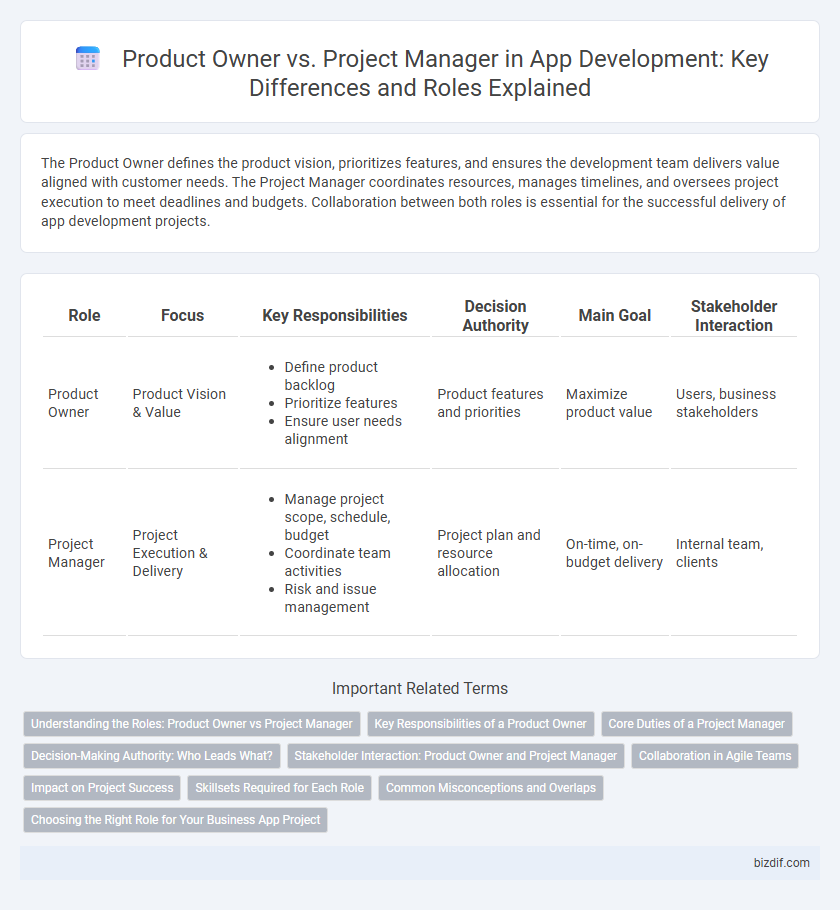The Product Owner defines the product vision, prioritizes features, and ensures the development team delivers value aligned with customer needs. The Project Manager coordinates resources, manages timelines, and oversees project execution to meet deadlines and budgets. Collaboration between both roles is essential for the successful delivery of app development projects.
Table of Comparison
| Role | Focus | Key Responsibilities | Decision Authority | Main Goal | Stakeholder Interaction |
|---|---|---|---|---|---|
| Product Owner | Product Vision & Value |
|
Product features and priorities | Maximize product value | Users, business stakeholders |
| Project Manager | Project Execution & Delivery |
|
Project plan and resource allocation | On-time, on-budget delivery | Internal team, clients |
Understanding the Roles: Product Owner vs Project Manager
The Product Owner defines the product vision, prioritizes features, and ensures the development team delivers value aligned with customer needs. The Project Manager oversees timeline, budget, and resource allocation, ensuring project milestones are met efficiently. Clear distinction between these roles enhances agile app development by balancing strategic direction with operational execution.
Key Responsibilities of a Product Owner
The Product Owner is responsible for defining the product vision, managing the product backlog, and ensuring clear communication of requirements to the development team. They prioritize features based on customer needs, market trends, and business value, acting as the voice of the stakeholders throughout the agile development process. Their key role involves making critical decisions to maximize product value and align development efforts with strategic goals.
Core Duties of a Project Manager
The core duties of a Project Manager in app development include defining project scope, setting timelines, coordinating cross-functional teams, and managing resources to ensure on-time delivery within budget. They are responsible for risk management, stakeholder communication, and maintaining project documentation to align with business goals. Effective project managers use tools like Gantt charts, Agile boards, and project management software to track progress and address any bottlenecks promptly.
Decision-Making Authority: Who Leads What?
The Product Owner holds primary decision-making authority over the product vision, feature prioritization, and backlog management to ensure customer value aligns with business goals. The Project Manager leads decisions related to project scope, resource allocation, timelines, and risk management to deliver the project efficiently within constraints. Clear delineation of responsibilities enhances collaboration, ensuring product quality and timely delivery in app development.
Stakeholder Interaction: Product Owner and Project Manager
Product Owners maintain continuous communication with stakeholders to prioritize features and ensure the product aligns with customer needs and business goals. Project Managers coordinate with stakeholders to manage timelines, resources, and project risks, ensuring smooth delivery within scope and budget. Both roles require effective stakeholder engagement, but the Product Owner centers on product vision while the Project Manager focuses on execution logistics.
Collaboration in Agile Teams
Product Owners and Project Managers play distinct but complementary roles in Agile teams, fostering collaboration through clear communication and aligned priorities. The Product Owner focuses on defining the product vision, managing the backlog, and ensuring customer value, while the Project Manager coordinates resources, timelines, and risk management to facilitate smooth project execution. Effective collaboration requires continuous feedback loops and transparency to adapt quickly to changing requirements and optimize team performance.
Impact on Project Success
The Product Owner drives project success by defining clear product vision and prioritizing features based on user needs, ensuring alignment with business goals. The Project Manager impacts success through efficient resource allocation, risk management, and timeline adherence, maintaining project scope and quality. Collaboration between both roles optimizes project outcomes by balancing strategic focus with operational execution.
Skillsets Required for Each Role
Product Owners require expertise in stakeholder communication, backlog prioritization, and business value analysis to ensure the product aligns with user needs and strategic goals. Project Managers need strong skills in resource allocation, risk management, timeline scheduling, and cross-functional team coordination to deliver projects on time and within budget. Both roles benefit from agile methodology knowledge, but Product Owners emphasize product vision while Project Managers focus on execution and process optimization.
Common Misconceptions and Overlaps
Product Owner and Project Manager roles often get confused due to overlapping responsibilities in app development, but the Product Owner primarily drives the product vision and backlog prioritization while the Project Manager focuses on timeline, resource allocation, and risk management. Misconceptions arise when stakeholders expect the Product Owner to manage project schedules or the Project Manager to define product requirements, leading to blurred accountability. Clear role definitions enhance collaboration by ensuring the Product Owner champions customer value and feature prioritization whereas the Project Manager orchestrates execution and delivery processes.
Choosing the Right Role for Your Business App Project
Choosing the right role between a Product Owner and a Project Manager is crucial for the success of your business app project. A Product Owner focuses on defining product vision, prioritizing features based on user needs, and ensuring alignment with business goals, while a Project Manager oversees timelines, resource allocation, and risk management to keep the project on track. Identifying whether your project requires agile product strategy or rigorous execution management helps determine which role brings the most value to your app development process.
Product Owner vs Project Manager Infographic

 bizdif.com
bizdif.com